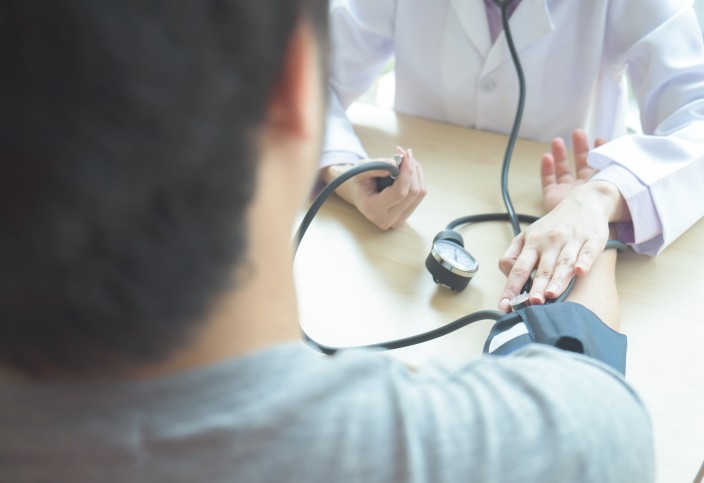
Hypertension is not an illness that happens suddenly. It builds quietly, exerting pressure on the arteries day after day. Each beat of the heart sends force against the vessel walls, and when that pressure remains too high for too long, it compromises the infrastructure of the circulatory system. Arteries adapt. But eventually, they lose their flexibility. The result isn't immediate collapse. It’s slow erosion.
This article examines hypertension through the lens of its mechanical impact - what are the causes, symptoms, and risk factors?
What Is Hypertension?
Hypertension is defined as the condition in which the force of blood flowing through your arteries is higher than what's normal. Blood pressure is measured in millimeters of mercury (mm Hg) and expressed as two numbers: systolic pressure over diastolic pressure.
According to standard medical definitions:
- Normal blood pressure: below 120/80 mm Hg
- High blood pressure: systolic between 120-129 mm Hg, diastolic under 80
- Stage 1 hypertension: systolic between 130-139 mm Hg or diastolic between 80-89
- Stage 2 hypertension: systolic at or above 140 mm Hg, or diastolic at or above 90
A hypertensive crisis requiring emergency medical intervention is identified when blood pressure exceeds 180/120 mm Hg.
What Causes Hypertension?
In most cases, hypertension doesn’t have a singular cause. The condition arises due to several causes. This type is referred to as primary (essential) hypertension, which tends to appear over time as arteries stiffen, and the body’s internal regulation mechanisms struggle to keep pace.
Common contributors to primary hypertension include:
- A high-sodium diet
- Excess body weight or obesity
- Sedentary lifestyle
- Long-term stress exposure
- Genetic predisposition
- Increasing age
Secondary hypertension is more severe than primary hypertension and it can be traced to a specific cause. Some of the causes include:
- Chronic kidney disease
- Obstructive sleep apnea
- Adrenal gland tumors
- Thyroid dysfunction
- Congenital heart defects
- Use of certain medications such as NSAIDs, decongestants, or birth control pills
- Substance use such as cocaine or amphetamines
Blood pressure can also vary situationally. For instance, some people experience “white coat hypertension,” where readings spike in clinical environments but remain normal at home. Others may show the opposite pattern, known as “masked hypertension.”
Hypertension Symptoms
The insidious nature of high blood pressure lies in its lack of symptoms. Most people don’t feel any different, even when their readings are dangerously high. It doesn’t present itself until complications have already started.
Still, in cases of severely high blood pressure, the following symptoms might occur:
- Unexpected Headaches
- Shortness of breath
- Spontaneous nosebleeds
- Heart palpitations or chest discomfort
- Visual disturbances
- Confusion, fatigue, lightheadedness
Even these signs are vague. They mimic other conditions like dehydration, anxiety, and menopause. That's why relying on symptoms to detect hypertension is inherently flawed. Regular screening is the only way to know.
Risk Factors of Hypertension
The development of hypertension is not random. It’s the outcome of interacting risk factors that accumulate over time. Some are modifiable while others are not.
Non-Modifiable Risk Factors:
- Age: As people get older, arteries stiffen naturally and increase blood pressure.
- Genetics: Family history plays an important role.
Modifiable Risk Factors:
- Obesity and excess weight: The more body mass, the more blood is needed to supply oxygen and nutrients. It increases the pressure on arteries.
- Physical inactivity: A sedentary lifestyle correlates with higher heart rate and reduced cardiovascular resilience.
- Tobacco use: Nicotine constricts arteries, and smoking accelerates vascular damage.
- Dietary habits: High salt intake, low potassium consumption, and heavy alcohol use are linked to high blood pressure.
- Stress: Chronic stress, combined with unhealthy coping mechanisms like overeating or drinking, worsens cardiovascular health.
- Other health conditions: Diabetes, high cholesterol, and metabolic syndrome significantly raise hypertension risk.
With the rise of digital screens, hypertension is affecting children as well. It is happening due to poor dietary patterns, lack of exercise, and rising childhood obesity.
Why Timely Diagnosis Matters
If left untreated, hypertension increases the risk of serious and irreversible complications:
- Heart attack or stroke due to arterial damage and blood clots.
- Aneurysm where blood vessels bulge and rupture.
- Heart failure as the heart muscle thickens and weakens over time.
- Kidney damage
- Vision loss due to blood vessel damage in the retina
- Vascular dementia caused by reduced blood flow to the brain
When to Get Checked?
Blood pressure screening should start at age 18 and be repeated at least every 2 years for those with normal readings. If you’re over 40, or under 40 but have risk factors, annual screening is strongly recommended. Don’t rely on occasional symptoms or use self-check kiosks without knowing how to use them properly.
A clinical setting is the most accurate and informed space to measure and interpret blood pressure.
Final Thoughts
Hypertension thrives on invisibility. But once its effects emerge, they are hard to reverse. Don’t assume you’re safe because you feel fine. The absence of discomfort is not the presence of health. Book an appointment with experienced doctors at Hinduja Hospital Mahim, Mumbai who will help you manage hypertension before it becomes something harder to treat.
Frequently Asked Question (FAQs)
Can you live normally with hypertension?
Yes, with regular treatment and lifestyle changes, most people with hypertension live a long, healthy life.
Can stress cause hypertension?
Yes. Stress can cause short-term spikes in blood pressure and lead to habits that increase long-term risk but don't directly contribute to hypertension.
How can I bring my blood pressure down urgently?
Try slow breathing and drink water. It will help you lower your blood pressure in 5 minutes If it stays high or you feel unwell, seek emergency care immediately.
Submit your query